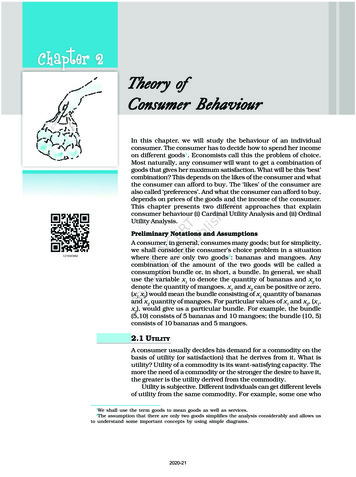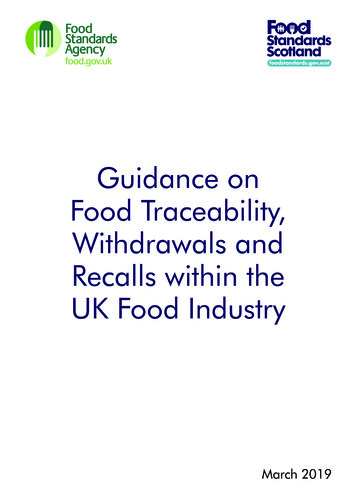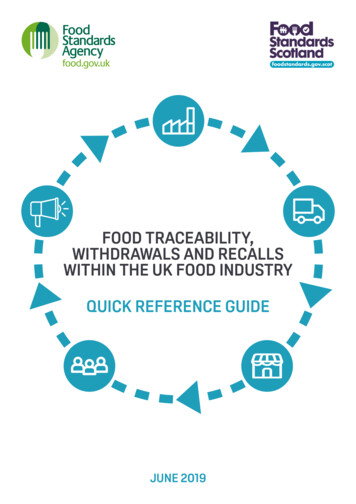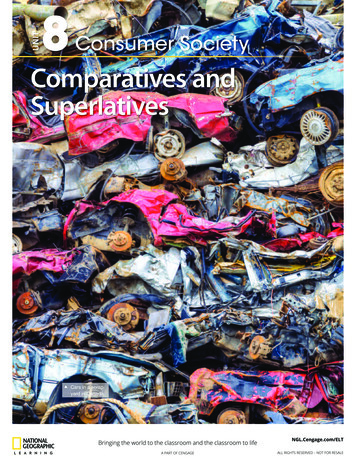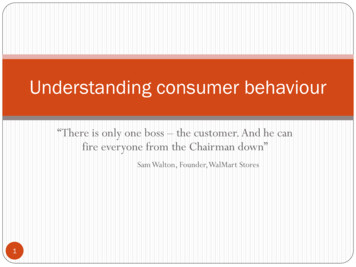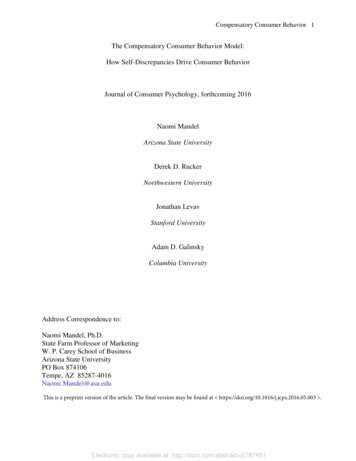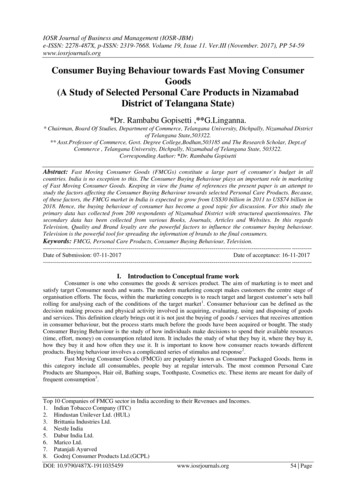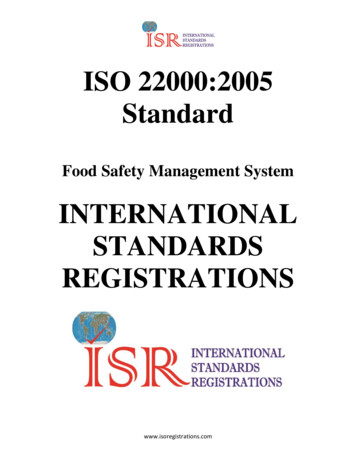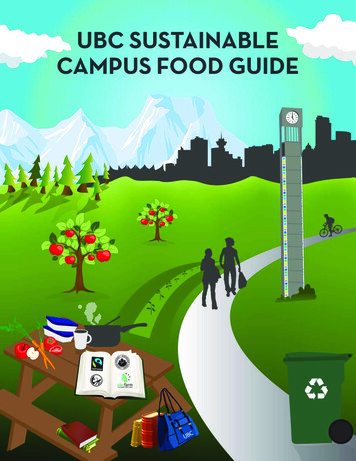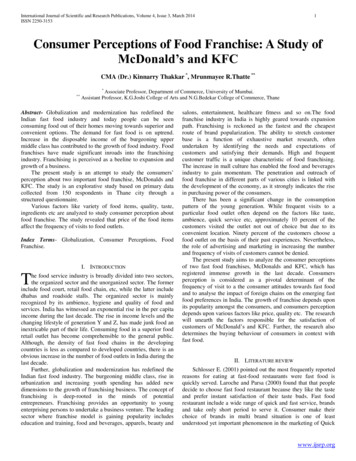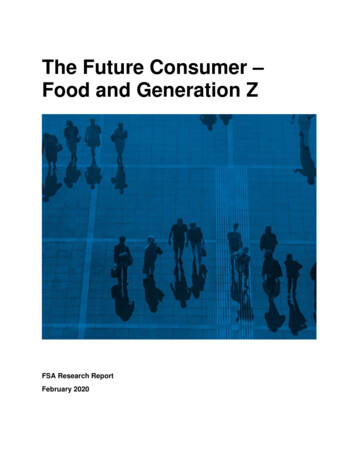
Transcription
The Future Consumer –Food and Generation ZFSA Research ReportFebruary 2020
Background and objectivesThis project is part of a Strategic Evidence Programme which addresses the FSA’scross-cutting and longer-term evidence needs. Since the FSA was established nearly20 years ago, the food system has grown ever more complex and we have seen shiftsin ways people access and share information about food, the way they groupthemselves, and in their trust and expectations of Government. Existing hypothesessuggests generational differences may become a more important influence onbehaviour than socio-economic differences – and that Generation Z (broadly 16-25 yearolds) appear to be connecting to food, to global systems, to information and toinstitutions in new ways.In this context, the FSA commissioned BritainThinks to conduct research to improveunderstanding of Generation Z and their attitudes towards food and the food system, toprovide a robust evidence base to inform strategic planning, policy andcommunications.The research set out to explore: Understand how 16-25 year olds engage with information about food and thefood system, and how they share information Understand how 16-25 year olds make decisions about the food they buy, andhow they communicate about food Understand how 16-25 year olds feel about the food system, including thevalues, hopes and concerns that they have about the current food system and inthe future Determine how 16-25 year olds differ from other consumers in their food attitudesand behaviours, and how they differ from young people of past generations Examine any sub-groups within the 16-25 year old age group, to understand howsocio-economic background, gender or other differences may influence views
Overview of methodologyThere were three stages to this project, firstly a Rapid Evidence Assessment (REA)overview; the full report has been published in parallel to this report. Secondly,qualitative research which included an online community over two weeks with fortyparticipants who were also asked to take part in deliberative focus groups over thecourse of the exercise, and to take part in a follow-up session. This was supplementedby ethnographic interviews with five participants. As part of the qualitative research wetested three various potential future scenarios with participants, based on the Foresightreport: Delivering on EU Food Safety and Nutrition in 2050 – Future challenges andpolicy preparedness.Thirdly, the hypotheses developed during the REA and the qualitative groups weretested in a UK representative survey (n.2500) with an upweighted sample of peoplebetween 16-25.More detail can be found in the accompanying technical report.Stage 1: Refining the briefRapid Evidence Assessment To cover existing academic and grey literature on Generation Z and foodInternal workshop Debrief REA findings and agree themes for primary researchStage 2: Understanding the audience 40 participants selected to undertake 4 phases of qualitative research Online community (split over two phases) - two weeks in totalDeliberative focus groups (split over two phases, 8 groups per phase) 90-minute groups 5 participants selected to undertake filmed ethnographic interviews 3 hour filmed interviewsStage 3: Quantifying resultsNationally representative poll with boosted sample of 16-25 year olds Sample of 2,475, with total sample of 619 x 16-25 To quantify findings and gain insight into how Gen Z compares to the widerpopulation
Key findings Gen Z’s food behaviours are strongly influenced by life stage and socioeconomic background. Those who are still living at home tend to have lesscontrol over and engage less with food choices. Meanwhile, students and thosein work are more engaged because they are budgeting and planning their ownmeals. Gen Z, alongside Millennials, are among the most likely to eat no meat or to bereducing their consumption of meat. They are also most likely to citeenvironmental concerns as the reason for this. Price is a stronger driver of food behaviours for Gen Z than for older generations.As such, despite being more likely to feel strongly about environmental or welfareissues, Gen Z are less likely than older generations to be ‘ethically-conscious’consumers. Aside from a minority of ‘conscious consumers’, Gen Z have low awareness andunderstanding of food system issues. The knowledge that does exist is oftenpatchy – picked up from encountering viral content on social media, mostfrequently on the topics of plastics and animal welfare. Thinking about the future, Gen Z care most about the environmental impact offood, and least about the global nature of the food system. Gen Z believetechnology will be key to delivering the food quality, variety and value they enjoytoday, with less harmful impacts. They also feel negative about the involvementof large corporations and monopolies in the food sector.Rapid Evidence Assessment findings: theories about Gen ZMultiple sources about Gen Z reviewed in the REA focus on the impact of being the‘social media generation’. Gen Z are often defined as the first true ‘digital natives’,marking them out as distinct from previous generations, in terms of their attitudes,identity, and behaviours. Brands have generated a lot of ‘hype’ about Gen Z as digitallynative, and their main interest is in Gen Z’s online lives, thinking about this from amarketing perspective. Beyond this, the association between Gen Z and tech leads tosomewhat negative stereotypes – that they are wedded to social media and technology,obsessed with and anxious about their online image, – overly emotional, with an inflatedsense of uniqueness and entitlement, and lazy and irresponsible.In addition to tech, theories about Gen Z are linked to the circumstances in which theyhave grown up, citing the financial crisis and austerity, the gig economy, the rise intuition fees and concerns about climate change which have led to them often beingcalled ‘Generation Sensible’. This is primarily associated with reductions in risky
behaviours such as drinking and drug taking and their inclination to save rather thanspend money.The REA found strong evidence that Gen Z are spending more time online; and aremore likely to report mental health issues. They have a strong sense of socialresponsibility, and care about the environment, and have a more international outlookthan previous generations. A more ‘fluid’ generation, they are less likely to identify asheterosexual and or with gender binaries. They value individualised and uniqueproducts, though they prefer experiences to material goods.There is work to be done in deepening understanding of this generation as currentevidence is thin. The bulk of information published on this generation is grey literature,and tends to have a branding and marketing focus, tending towards generalisation andoverclaim. Few peer-reviewed studies and longitudinal sources are available and verylittle attention is paid to the extent to which findings are a ‘cohort effect’ (i.e. aphenomenon particular to a generation), a ‘period effect’ (i.e. is this shift happening toeveryone) or a ‘life-cycle effect’ (i.e. have young people always been like this?).Findings about consumption trends come entirely from grey literature, and most of theresearch focuses on stated preferences rather than reported or actual behaviour.Meanwhile, Gen Z feel misrepresented by blanket claims. According to a survey of2,000 British adults, 74% of 18-24-year olds say they feel young people aremisunderstood. Stereotypes about Gen Z are reductive, rarely underpinned byevidence, with robust data in short supply.The REA found very limited evidence about Gen Z and food, but existing data showsthat Gen Z have a typical teenage diet. Gen Z are perceived to have embraced meatfree diets more than older generations, including Millennials. However, there have beenthree UK-based surveys on rates of vegetarianism and veganism by generation whichshow that the number of vegetarians and vegans is growing rapidly, and all surveysshow the number of Gen Z vegetarians and vegans being in line with those ofMillennials. Between 1-5% of 16-25 year olds have been reported as vegan and 5-12%are vegetarian, but current evidence about the motivation behind veganism andvegetarianism is inconclusive. Although it is widely reported that Gen Z are leading thevegan and vegetarian movement, this does not appear to have translated into theirconsumption behaviour.According to the FSA’s Food and You survey, those aged 16-24 years old are the leastlikely to say they eat fruit and vegetables and show higher consumption of fast foodsand takeaways. However, evidence suggests that this is due to life stage, rather thanbeing a cohort effect. Making ‘healthier’ food choices generally increases with age, aspeople become more health conscious and have higher incomes. An absence oflongitudinal data examining food consumption makes it difficult to assess whether theseare true generational differences.
Insights from our qualitative and quantitative researchIn many ways Gen Z are just like young people in generations before them. They arefocused on the next immediate milestone and find it difficult to look ahead to themedium/ long term. They are interested in trying new things and feel they are moreaccepting of difference than older generations. They are still at a point of flux in trying tounderstand what they believe and what they want in life. This means they often don’thave strong views; they are still deciding what they believe in and they have their mindson their immediate concerns rather than on ‘big issues’ facing society.“I worry in the short term about deadlines and having an essays, to be honestthat's one of my only worries.” (Cardiff, 20-25, ABC1)“I’m looking forward to going to uni and meeting new people. I also hope to goabroad and experience a new country.” (Cardiff, 16-19, C2DE)“Me and Peter have very different views, but we respect that, and we get onalright” (Belfast, 16-19, ABC1)Life stageThere is a great deal of variation within Gen Z, determined by their life stage, as well astheir socio-economic background. We saw clear differences between those in school,between 16-19 years old, living at home with their parents, those in Higher Education,mainly aged between 19-25 years old, living in student accommodation or in the privaterented sector and those in employment, aged between 19-25 years old, who can beeither still living at home or living away from home with flatmates a partner, or children.Within each of these groups, socio-economic grade is a key driver of difference. Thosefrom higher socio-economic grades tended to have higher starting levels of awarenessand engagement with current affairs and more confidence in expressing opinions onpolitical or social issues.
School Eat what your parents eatMain food choice is after school / fast food“If it’s your mum you are just going to eat whatever she prepares.” (London, 1619, C2DE)University Starting to experiment and gain skillsLearning to budget for the food shop“At uni I’ve become more independent, learnt how to cook a lot of new foods ratherthan sticking to my staples.” (Cardiff, 20-25, ABC1)Working Established preferences and routineMore practiced at saving money e.g. weekly food shop“I plan all of our meals for the week ahead of time and make a big list on Sunday andthen do the weekly shop. It saves us money to plan and it means I can relax in theevenings after work.”(Colne, 20-25, C2DE)Those still at school are less engaged with social affairs and less confident in their ownopinions. They are focused on exams and their friends. Current affairs feel removedfrom their lives, and are not something they talk about with friends. They are lessconfident in themselves and in their own opinions. They feel that there is still a lot theydon’t know, and they often feel ill-equipped to arrive at any conclusions. They tend to beliving at home with their parents, who usually buy and prepare food for them on theirbehalf. The main food decisions they take individually relate to choosing snacks orwhen out and about with friends.
Those at university are gaining a wider set of experiences and gaining in confidenceand skills. They are engaging with a wider and more diverse set of friends and are themost likely to be engaged with wider issues facing society, and the most confident inexpressing opinions about these. At this stage, most have left the family home and areresponsible for their own budgeting, food shopping and cooking. They are moreengaged with their food decisions, but also still just getting used to this freedom. Mostprioritise cheap and convenient food to fit around tight budgets and unpredictableschedules.Those who are working tend to be more settled in their opinions and behaviours. Thisgroup are either living away from home with their flatmates or their partner, and aremore settled in preferences and opinions, and confident in expressing these. They tendto be planning for the next five years. At this stage, they have full autonomy over theirfood decisions are are more settled in their food behaviours. They are more likely tohave an established routine when it comes to food, with some describing regular weeklyfood shops and meal planning.Social mediaWhen asked what sets their generation apart, participants were most likely to say socialmedia. Feeling the need to post online about what you’re doing, your achievements andyour feelings is something they recognise as being more prevalent amongst their agegroups than older ones. Although many we spoke to said that they worry about theirmental health, and see social media as a key driver of this. Several participants saidthey had tried or were considering cutting down on their social media use.Concern about the futureGen Z report high levels of concern about the future they face, but the most commonreaction to this is hopelessness rather than activism. Although they have differentstarting points, nearly all reported a sense of overwhelming negativity when consideringthe future. Brexit, austerity, climate change and knife crime the most frequently citedissues of concern. The REA also identified a marked increase in pessimism among thisgeneration. The dominant mood is apathy driven by a sense of powerlessness. Whilesome spontaneously mentioned Greta Thunberg, most were sceptical about the powerof young people to change the status quo.Food personalitiesIn the qualitative research, different food ‘personalities’ emerged, which describedifferent food priorities, values and behaviours.
Some of the Gen Z personalities described eating a lot of fast food and taking littleinterest in food. While budgeting on food was a priority for most of our participants,some found this much less of a sacrifice than others. These participants tended cookrarely, instead buying cheap convenience food; often eat the same foods habituallyrather than trying new things, and eat fast food when eating out.In contrast to those not thinking much about food, some participants see food as apriority and take a great deal of interest in what they eat. However, many of ourparticipants were very different to the takeaway obsessed stereotype. They werethinking deeply about their food, either from a nutritional point of view or for pleasure.These participants tended to cook regularly, use social media to find new recipes / diets,eat out and try new places and to be very interested in exercise and fitness.The survey shows that the variety of food personalities observed in Gen Z is broadly inline with the rest of the population.
Price ConsciousA key difference between Gen Z and older age groups is over how price conscious theyare. This is most likely a life stage effect. Across the sample, our participants wereengaging in price conscious behaviours, using vouchers, deals and student discounts,favouring budget supermarkets. The survey findings suggest that this a life stage effect,with price generally becoming less of a concern as people get older.But not ‘conscious consumers’Compared to other cohorts, Gen Z are less likely to be ‘conscious consumers’. Acrossall age groups, ‘Conscious consumers’ are more likely to be vegetarians or vegan, toclaim knowledge about the food system, and to buy organic and pay attention to foodlabelling. Among Gen Z, conscious consumers are rare: in the qualitative research,most participants rarely gave much thought to where their food comes from. This maycome as a surprise given the evidence about Gen Z’s stated values about social issuesand the environment – it seems this rarely translates into consciousness about the foodsystem.Food values versus food behavioursWhen it comes to nutrition, environment and ethics, Gen Z values are not alwaysin line with their actual behaviour. FSA ‘Food and You’ data indicates that 16-24 year
olds are the least likely to say they eat fruit and vegetables and the most likely to saythey eat pre-packaged meals, ready meals and burgers. This is supported by thequalitative research in which participants were often choosing to eat fast food when outwith their friends. This was most true of 16-18 years old for whom getting fast food withfriends is an important part of socializing. Other consumers also recognise this patternamong Gen Z.Health consciousHowever the data suggests that Gen Z is also a health-conscious generation. Gen Z aremore likely than Millennials to say they prioritise nutritional content and are one of theage groups most likely to be using fitness apps. This is in line with the findings in thefocus groups and online community where we heard a lot of interest from participants inhealthy eating, often being driven by social media and body image pressures. Someparticipants were also quite knowledgeable about diets and foodMany said that healthy eating was their main aspiration for the future when they think offood.Environmentally aware but price drivenGen Z think of themselves as an environmentally minded generation, even if this isn’tsomething that applies to them personally. Our participants were aware of this narrativearound Gen Z and said that they hear friends and family say that young people areeating less meat and that young people care more about the environment. Participantsfelt that they had noticed a difference between their generation and others when itcomes to an openness to new ways of thinking about food, particularly around
veganism and vegetarianism. Gen Z is slightly more likely to be buying organic, but isless likely to be buying locally produced food or food with less plastic packagingIn the qualitative we heard that participants regard these environmentally-friendlybehaviours as out of reach for them at this point in their lives due to price pressures.However, the picture is more complex when it comes to other environmentally drivenfood behaviours.Animal welfare was one of the few food system issues raised spontaneously byparticipants in the research. Many said they had seen information about this on socialmedia, however, the quant data suggests that Gen Z are in line with the rest of thepopulation in terms of level of concern over animal welfare. Gen Z see themselves ascaring more about animal welfare than other age groups, but are less likely to be buyingfood that has been produced to high animal welfare standards than other age groups.This was borne out in the qualitative research, where most participants said that thiswas not something they were prioritising in their food decision making, despite beingaware of the issues, again, this was often felt to be due to cost pressures makingethically driven choices more difficult.Gen Z are more likely to be changing their behaviour around meat consumption thanany other age group, and they are more likely to say they are doing this forenvironmental reasons. However, this is still a relatively small proportion of Gen Z, andshould not be taken to mean that this is a trend that affects all of 16-25 year olds. Gen Zfrom higher social grades are twice as likely to be vegetarian / vegan than those fromlower SEGs (12% ABC1 /6% C2DE) and female Gen Z are more than twice as likely tobe vegetarian/vegan than male (13% versus 7%).Participants in the qualitative research saw a clear trade off between price and healthy,environmentally friendly, or ethical food behaviours. Many expressed a desire to engagein these behaviours more in the future.School“I care about how filling it is for the price like bread rolls in supermarkets are goodbecause they are often cheap and filling.” (London, 16-19, C2DE)University“I don’t want to know more, because so much of the food probably comes fromdisgusting places. I can’t afford things that are really pricey and higher welfare.”(Cardiff, 20-25, ABC1)
Work“I feel like I always used to care about price and go for the cheapest option, but now Ithink more about where the food comes from and what effect it has inside your bodyand how it's been processed.” (London, 20-25, ABC1)Digital media and foodGen Z spend significantly more time on food related activities on social media thanother age groups, primarily using social media to get information and to engage inconspicuous consumption.Gen Z are not engaging with news stories about food more than other age groups. Thisis striking given the perception of Gen Z as an engaged, socially conscious generation,as well as being ‘digitally native’. In the qualitative research participants spontaneouslyshared stories about recipes, socialising with friends and following celebrities, but rarelyshared any news stories about food. Despite them not proactively seeking out thisinformation, their use of visual platforms means they are more likely to be seeing ‘viral’content.Gen Z are not using food related apps more than any other agegroupsFood delivery apps were seen as a luxury by participants rather than something theyuse all the time. There was little demand for personalised services from participantsFew had used any recipe or ingredient delivery services and most saw this as out ofreach for their budget.
The food systemGen Z are less likely to care to be worried about importing food from abroad and lesslikely to be worried about food safety and hygiene. In the qualitative research,participants showed a high level of spontaneous trust in the regulation of the foodsystem, and therefore did not see food safety and hygiene as an issue of concern. Theyalso do not see the importing of food as an issue in and of itself, although they do worryabout the impact this has on the environment.As with consumers in general, Gen Z are rarely thinking about the system behind foodproduction. Participants said they take the system of production and processing forgranted, as food is readily available, decision-making around food is often habitual andit is not a topic of discussion with friends/ family. However, the survey shows that Gen Zare slightly more likely than older generations to claim knowledge of the food system.This may be a life stage effect e.g. they are possibly more likely to have learnt aboutthis in school recently, or it may also be related to increased exposure to food systemissues through social media. Gen Z’s knowledge of the food system is patchy – they areengaging with ‘trending’ issues rather than the system as a whole. Where they haveengaged with food system issues, this tends to be through school, social media or theirpeers. They will often have knowledge of one quite niche topic but lack the widercontext to that issue e.g. knowing that cows ‘fart’ but not understanding the pressurelivestock production places on natural resources.Animal welfare“Animal welfare is still not up to the standards that it should be. In particular, thewelfare of chickens in industrial farming.” (Cardiff, 20-25, ABC1)
Plastic“Recently I have been aware of the amount of plastic packaging that is produced tokeep our food in. Plastic can hurt animals, I think this is an important issue.” (Cardiff,20-25, ABC1)Health“I read an article on the BBC about a young boy who has gone blind from eating junkfood every day. It goes to show how important following a healthy balanced diet is!”(London, 16-19, C2DE)Hygiene“I have seen numerous videos on social media that have shown factories droppingchicken on the floor and picking it back up, pumping the chicken up with variousfluids.” (London, 16-19, C2DE)The quant data suggests that Gen Z are more likely to care about the environmentalimpact of food than other age groups. Older Gen Z and those who identify as ‘consciousconsumers’ tend to have higher levels of knowledge of food system issues. Thequalitative findings suggest this is more of a vague concern rather than an informedunderstanding of the issues. Most said they had never thought about climate change inthe context of the food system before. While there was awareness that meat productionhas an impact on the environment, the underlying reasons for this are not wellunderstood. Beyond this, participants struggled to name any other food relatedenvironmental issues apart from plastic packaging.
Global food security and the environmentMuch of the information provided on the environmental impact of food production wasnot previously known to participants e.g. impact on resources, water and biodiversity.This information tended to have a big impact on participants, with many focusing theirindependent research on this topic. Participants were particularly concerned about foodsecurity which they had never considered in the context of the UK before. Some felt thatthe challenge is around distribution rather than productionComplex food supply chainsThere was high awareness that food travels around the world and awareness ofprominent food crime cases, such as horsemeat. Very few were concerned about thisand indeed many saw advantages to consumers, including more choice andconvenience, with a strong system in place to protect them as consumers. However,some did feel that the amount of food the UK imports is surprisingly high and felt that infuture it would be good to rebalance this.Affordability and accessThis was an issue that participants felt personally familiar with, having noticed thedifference in price between healthy food and junk food. However, there was still surpriseat the extent of inequality in the food system. The term ‘food desert’ was not one thatmany had heard before but for some it resonated as something they recognised, andfelt strongly about. The information had a big impact on participants with many comingto see this as an important social issue which they think should be prioritised in futurediscussions about the food system.
The impact of participationLearning about the food system made participants more engaged but didn’t trigger anysignificant changes to behaviour. Between the first and second set of focus groupsessions, participants became noticeably more engaged in the researchMany went above and beyond in what was asked of them in their independent researchtask. The food system challenges that resonated the most were the environmentalimpact of food production, which is not just limited to meat, animal welfare beingcompromised in order to produce cheap food, and the high cost of healthy food that isunaffordable and inaccessible to some people on lower incomes.In the survey we asked what one change Gen Z wanted to see in the food system in thefuture.Future scenariosWe tested three various potential future scenarios with participants, based on theForesight report: Delivering on EU Food Safety and Nutrition in 2050 – Futurechallenges and policy preparedness.Attitudes to technologyIn the focus group discussions, Gen Z spontaneously identify technology as key toaddressing the challenges of the future food system. There is a strong feeling thattechnology will play an important role in responding to the problems currently facing thefood system. Whilst actual knowledge and awareness of specific technologies was low,Gen Z showed an openness to accepting these technologies, even where trade-offswere highlighted. There is also a belief that the prevalence of vegetarianism andveganism will increase, with people generally eating less meat. Despite Gen Z being soprice-driven, cost and affordability do not emerge as the highest-ranking future priorities.This could in part be because they hope they will be able to buy ethically andsustainably in future.Technological solutions feel plausible and sensible to Gen Z, matching their assumptionthat technology will play a significant role in the future, Powdered, functional foods arewell-recognised among Gen Z – so an intuitive way to increase production, reducewaste, and to improve overall population health. There was some concern about
processed foods and their unknown and unintended consequences, and minorresistance to the idea of food being purely functional and the loss of connection,balanced by an intuitive sense that technology will make food production quicker,easier, and more environmentally friendly. Interest was sparked by modern, sustainablefarming techniques e.g. vertical farming, but there was some concern about theunintended consequences of technology e.g. GM, and the impact of this scenario on thelivelihoods of farmers. There was some openness to eating insects or lab-grown meat inabsence of alternatives, though this varied widely. ‘Conscious consumers’ were morelikely to eat lab-grown meat than animal meat, but others feel uncomfortable, wantchoice, and feel they would need to be strongly ‘nudged’, showing a preference fornatural over ’fake’.Local and regional food productionLocal and organic produce is supported primarily due to environmental benefits,sustainability and healthiness, and there was some sense that this scenario would alsohave a positive impact on local economies. It felt like an idyllic and nostalgic scenarioand
Millennials. Between 1-5% of 16-25 year olds have been reported as vegan and 5-12% are vegetarian, but current evidence about the motivation behind veganism and vegetarianism is inconclusive. Although it is widely reported that Gen Z are leading the vegan and vegetarian mov

